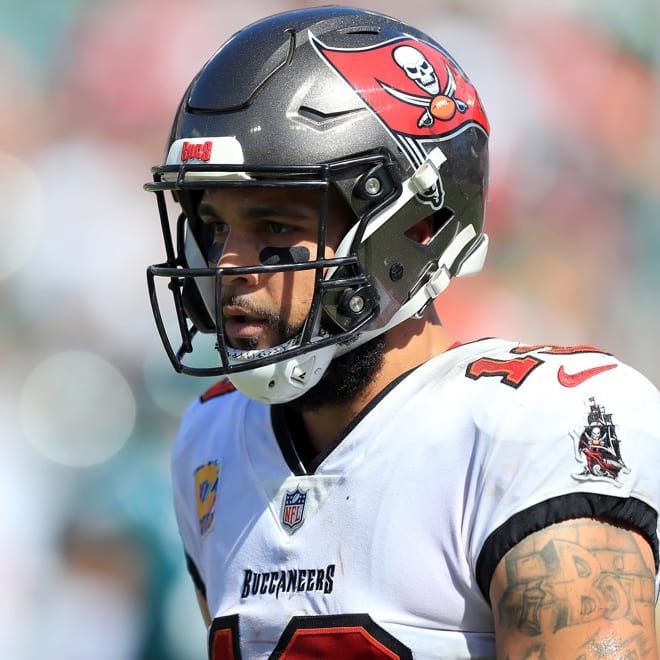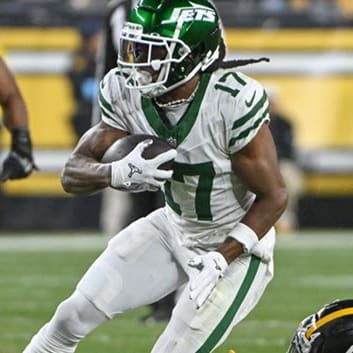This article is part of our NFL Offseason Watch series.
The Aaron Rodgers vs. Drew Brees debate that dominated most fantasy quarterback discussions a year ago was blindsided by the improbable resurgence of Michael Vick, who overtook Philadelphia's starting spot when Green Bay's defense dealt Kevin Kolb a concussion in Week 1.
Playing only one half against a tough Packers defense, Vick threw for 175 yards and a touchdown while running for 103 yards. While coach Andy Reid wouldn't admit it at the time, it was a performance that left Philadelphia with no choice but to hand Vick the keys to the offense.
Fantasy owners who picked up Vick after that game went on to reap huge benefits -- more points on a per-game basis than any other quarterback could provide. The Atlanta version of Vick was a fantasy force in his own right, but the new version put up numbers that were downright comical at times. In the two games following his Green Bay performance, Vick totaled 575 yards and five touchdowns through the air while adding 67 yards and another touchdown on the ground.
Projecting Vick's numbers from his two and a half games over 16 games gives the quarterback 4,800 yards and 38 touchdowns through the air with 1,088 yards and six touchdowns on the ground. Vick's production was simply unbelievable.
But Philadelphia's Week 4 matchup with the Redskins reminded us why it was all so difficult to believe. A 6-foot, 215, quarterback just can't last if he takes 10-to-15 hits a game, especially if he's
The Aaron Rodgers vs. Drew Brees debate that dominated most fantasy quarterback discussions a year ago was blindsided by the improbable resurgence of Michael Vick, who overtook Philadelphia's starting spot when Green Bay's defense dealt Kevin Kolb a concussion in Week 1.
Playing only one half against a tough Packers defense, Vick threw for 175 yards and a touchdown while running for 103 yards. While coach Andy Reid wouldn't admit it at the time, it was a performance that left Philadelphia with no choice but to hand Vick the keys to the offense.
Fantasy owners who picked up Vick after that game went on to reap huge benefits -- more points on a per-game basis than any other quarterback could provide. The Atlanta version of Vick was a fantasy force in his own right, but the new version put up numbers that were downright comical at times. In the two games following his Green Bay performance, Vick totaled 575 yards and five touchdowns through the air while adding 67 yards and another touchdown on the ground.
Projecting Vick's numbers from his two and a half games over 16 games gives the quarterback 4,800 yards and 38 touchdowns through the air with 1,088 yards and six touchdowns on the ground. Vick's production was simply unbelievable.
But Philadelphia's Week 4 matchup with the Redskins reminded us why it was all so difficult to believe. A 6-foot, 215, quarterback just can't last if he takes 10-to-15 hits a game, especially if he's running at high speeds when he takes a good portion of those hits. So when Vick left that game and missed the next three after taking a hit to the ribs, it confirmed the suspicion that Vick's gigantic numbers weren't sustainable.
Heading into 2011, everyone knows what they're getting with established commodities like Rodgers, Brees, Philip Rivers, Tom Brady, Peyton Manning and Tony Romo. The numbers likely won't match Vick on a per-game basis, but you have better odds of getting 16 games out of them. But Vick remains a big wild card, and it's difficult to rank him relative to his competition.
Nonetheless, we did our best to rank the top fantasy quarterbacks heading into the 2011 season. These rankings are based on 20 passing yards per point and four points per passing touchdown scoring systems.
1. Aaron Rodgers, Green Bay
While Rodgers doesn't throw the ball enough to keep up with Drew Brees' passing yardage and touchdowns, his steady average of roughly 300 yards and four touchdowns on the ground covers that gap. And unlike Vick, Rodgers has generally shown an ability to play the full season. Despite his concussion injury in 2010, Rodgers has still only missed one regular season game in three years. That reliability makes him the safer early pick than Vick, and his upside exceeds that of Brees.
2. Michael Vick, Philadelphia
History says it's unlikely Vick will play the full season, but he might only need something like 13 games to justify being the second quarterback off the board. In Philadelphia's pass-happy and quarterback-friendly offense, it's likely that he'll outpace all other passers on a per-game basis. Even in his so-called "decline" in the second half of 2010, when he threw six interceptions in five games, Vick still posted an average of roughly 30 fantasy points per game, and he did so in a consistent fashion. If he's on the field, he's money.
3. Drew Brees, New Orleans
Playing on a bad knee for much of the year, Brees had another impressive season in 2010. The 22 interceptions weren't good, but it's hard to fault a player who throws for 4,620 yards and 33 touchdowns. He has 101 touchdowns through the air in the last three years, which means he has as high a floor as just about any quarterback. If he can improve his yards-per-attempt average of 7.0 from last year, he could be in for another 5,000-yard season. He has missed just one game in the last six years.
4. Peyton Manning, Indianapolis
Manning averaged an unimpressive 6.9 yards per pass attempt last year, but 679 pass attempts will cover that up fairly well. Manning doesn't have huge upside at this point in his career, but five consecutive years with at least 4,000 passing yards and 30-plus passing touchdowns in four of the last five years means Manning is arguably the most sure thing you can find at quarterback.
5. Philip Rivers, San Diego
Rivers has posted staggering averages of 8.7, 8.8 and 8.4 yards per pass attempt the last three years, indicating he might have more big-play ability as a passer than anyone in the league. The problem is that Norv Turner is committed to running the ball, so Rivers won't throw it as often as Brees or Manning. Still, he's a rock-solid bet to surpass 4,000 yards and hover around 30 touchdowns through the air.
6. Tony Romo, Dallas
Romo is a bit of an injury worry after suffering a broken clavicle last year and missing three games with a hand injury in 2008, but his upside is big thanks to playing in a pass-happy and productive offense. He has averaged more than eight yards per pass attempt in three of his years as a starter, and he can be expected to average about two passing touchdowns per game.
7. Tom Brady, New England
This might seem low for a player who threw 36 touchdowns a year ago, but it's tough to see him matching that total in 2011. New England's newfound appreciation for running the ball resulted in Brady's pass attempts dropping from the 570-range to about 500, and his ratio of roughly 14 pass attempts per passing touchdown is unlikely to be sustained. It's also worth noting that his numbers weren't super-consistent last year, as he had six games with less than 200 yards passing. There's no doubt he'll put up numbers when New England throws it, but the demand just wasn't there as much last year.
8. Ben Roethlisberger, Pittsburgh
For two straight years he's averaged numbers that translate to about 4,200 passing yards per season, and he can be expected to make a push for about 30 passing touchdowns, too. He offers more on the ground than Brees, Manning, Rivers and Brady, but not as much as Rodgers.
9. Matt Schaub, Houston
Eli Manning was a tempting option here, but Houston has shown a more thorough commitment to throwing the ball than the Giants. Schaub doesn't seem like the type who is likely to surpass 30 passing touchdowns in a season, but he does seem likely to hover in the 4,500-yard range as long as he plays 16 games. After being frequently injured for a large portion of his first five seasons, Schaub has started all 16 for two years straight.
10. Eli Manning, New York Giants
Despite throwing 25 interceptions last year, Manning has actually been quite sharp the last two seasons. Many of his interceptions from 2010 resulted from deflections off his receivers' hands, so this season he's more likely to see something like the 14 interceptions he threw in 2009. It seems like the Giants aren't as committed to the run as they were a few years ago, so Manning should keep airing it out a good amount, though the health of Steve Smith (knee) and Hakeem Nicks (multiple) is a concern.










